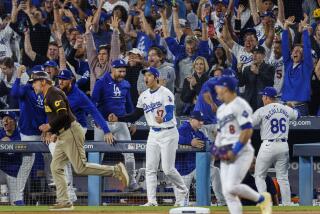In His Own League : Baseball: John Hart is well-versed in the national pastime. His musings about the game can be heard on his new poetry hot line.
SANTA MONICA — Forget ESPN. Forget the sports page. When it comes to baseball, they provide little more than box scores and batting averages.
Only the Baseball Poetry Hotline offers day-by-day poetic interpretations of major-league action. Only this telephone service promises recorded messages of universal truth, the Zen and gestalt of the national pastime.
“I won’t tell you what some guy’s batting average is because I don’t care,” said John W. Hart III, the hot line’s voice and muse. “As a poet, I can rant and rave about the game. I can step outside reality.”
The truly sensitive fan can sample daily poetic tributes, philosophical meanderings and absurd metaphoric snapshots of baseball. Last Tuesday’s message, for example, was a Taoist praise of Opening Day:
In the Beginning there was Oneness.
. . . When players step between the lines,
They become one with the sky, the Earth,
The grass, the clay and the chalk.
Hart, a 32-year-old insurance salesman from Santa Monica, has the folksy manner of a next-door neighbor who’s always borrowing your lawn mower. He has written two collections of baseball poetry as well as other published verse.
The hot line began with this new season, as Hart embarked on a 162-game search for wisdom between the foul poles. His gaze will encompass the entire league, sometimes settling on his favored Dodgers. But the former Little Leaguer’s attention is not confined to the playing field.
“A foul ball went into the stands and hurt a kid,” he recalled of a recent game. “An older man caught the ball as it ricocheted off the kid’s leg. Everyone started yelling, ‘Give the kid the ball!’ But the old guy wouldn’t, so I had to write a poem about it.”
The diamond long has been fertile poetic ground, dating to the 1888 classic, “Casey at the Bat.” Songwriter John Fogerty once crooned of his love for the game. Historian Jacques Barzun stated: “Whoever wants to know the heart and mind of America had better learn baseball.”
Heart and mind notwithstanding, Hart is fascinated by baseball’s soul. He first wrote about the sport in 1988, when he followed the Dodgers through a season and produced a book, “Dugout Poems,” which devoted a poem to each game. In “Fernando Finally Gets It,” Hart waxed romantic about Valenzuela’s 5-2 win over the Atlanta Braves, the pitcher’s first win in almost a year:
I think I know
how Fernando felt
going a year without a win.
In the ‘70s
In an era
when my friends were
living out
teen-age sex movie scripts
I had gone a year, also,
without the affections
of a woman
The book, published in 1989, got mixed reviews. A Village Voice critic wrote that Hart’s poetry had a “scattered quality” but could “often be funny as hell.” The National sports daily said: “His poems are sometimes corny, sometimes clever.”
Such verse comes from a man who uses poetry to balance a career of selling insurance policies. Hart is given to wearing dark suits from 9 to 5. He is quick to laugh and shake a hand, which is to say that he seems more like a salesman than a poet.
Hart first put pen to paper in 1986 and three years later stumbled into national attention. In the aftermath of the congressional Iran-Contra hearings, he ferreted through hours of testimony by Lt. Col. Oliver North. Hart extracted portions and cast them as poems, such as “How to Deal With Iranians”:
That was a
bald-faced lie
told to the Iranians,
and I will tell you right now
I’d have offered the
Iranians
a
free
trip to Disneyland
if we could have gotten
Americans
home for it.
These poems appeared everywhere from Harper’s to the LA Weekly. The Los Angeles Reader labeled Hart “a unique stylist and a wry verse raconteur.” On the heels of such success, he turned to baseball.
“The game hasn’t changed, so you can get a 10-year-old boy and a 40-year-old man and a grandfather and they have something in common,” Hart said. “Plus, it’s such a slow-paced game that it allows time for reflection.”
The poet does most of his reflecting on the freeway while trudging through rush-hour traffic and listening to Dodger announcer Vin Scully on the radio. He recites into a Dictaphone. At the stadium--Hart attends at least 40 games a year--he rattles off stanzas from the stands.
In an era when gambling arrests and contract disputes overshadow home runs and strike outs, Hart’s soon-to-be-published collection, “The Tao of Baseball,” argues for the spirit of the sport:
The Tao of Baseball . . .
. . . feeds all and is endless.
It cleans pine tar off suspected bats.
It unifies all clubhouse squabbles.
It unites the fans.
It brings absolute harmony during the
Seventh Inning Stretch.
Hart does not ponder such musings for hours. The Dictaphone method of poetry lends itself to rapid-fire creation. Words and images leap off the top of his balding head to the tip of his tongue.
“A lot of poets are really introspective,” he said. “I just do it. I have something to say and I say it.”
As for the hot line, the poet isn’t worried about producing under daily deadlines.
“It’s pretty easy to get a poem at the park,” he said. “I try to find one snapshot, one little thing that happens.”
And he chuckles at the irony that his poetry is inspired by athletes who probably don’t read or listen to it. A call to the Dodgers’ headquarters confirmed that the team wasn’t even aware that a poet had chronicled its 1988 season.
The next season, Hart fulfilled a childhood fantasy by visiting the dugout before a game. He introduced himself to Kirk Gibson, a star outfielder.
“Gibson asked me, ‘What are you doing here?’ ” Hart recalled. “I said, ‘I’m a poet,’ and he told me to get out of his face.”
The Baseball Poetry Hotline number is (213) 281-7447.
More to Read
Go beyond the scoreboard
Get the latest on L.A.'s teams in the daily Sports Report newsletter.
You may occasionally receive promotional content from the Los Angeles Times.











